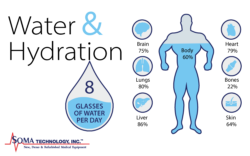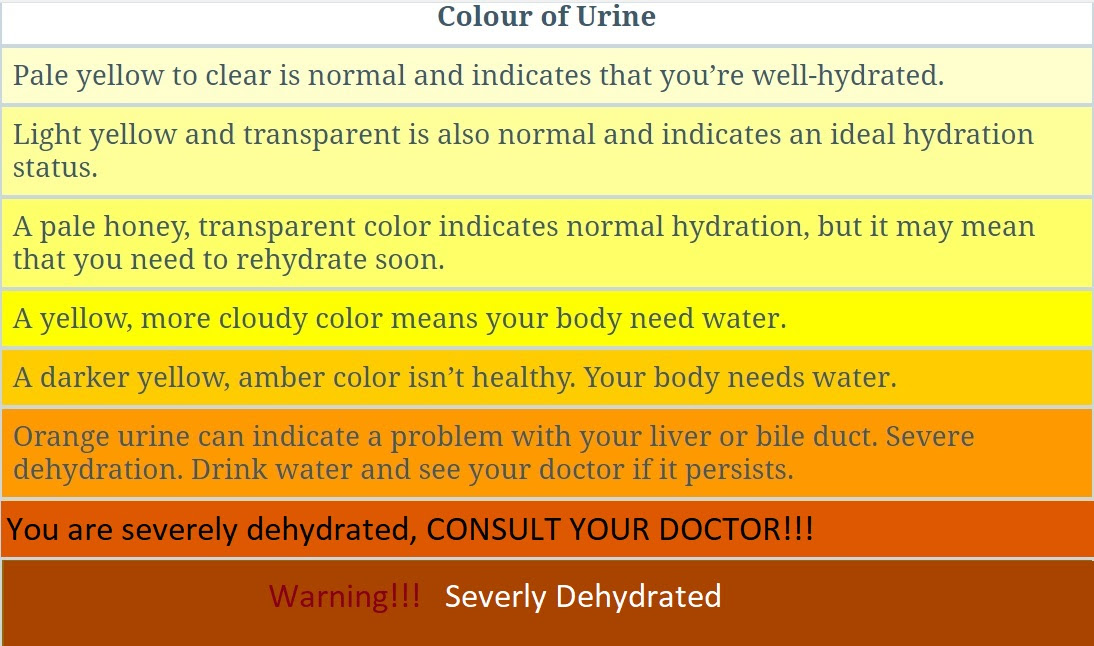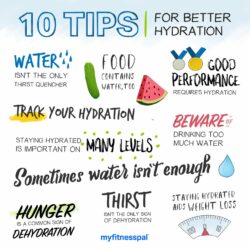By Jane Lees at

Around 60% of your body is water and it plays a vital role in every bodily function. You can lose a lot of fluid when you exercise – as much as a litre or two an hour – mainly through sweating and breathing. So, you’ll need to drink more when you exercise
If you don’t top this fluid back up, you can get dehydrated. This can affect both your general health and how well you can exercise. You’ll feel tired more quickly if you’re dehydrated, and you won’t be able to control your temperature as well as usual
Water helps fuel your muscles, so drinking before, during and after exercise will boost your energy levels, and may help to prevent cramp.
Hydration before you exercise
It may not cross your mind, but making sure you’re well hydrated before you exercise is really important, especially in hot conditions.
If you’re dehydrated before you start exercising, your core temperature will rise faster, and your heart will have to work harder than usual. This will affect your performance and can even lead to heat stroke. Drinking enough will help you get the most out of your exercise session and feel good while you’re doing it
Now, that doesn’t mean downing a drink before a walk. The key is to stay on top of your hydration all the time. That way, you create a balance between what you drink during a walk and what you get rid of through sweat
One quick way to test if you’re hydrated is to check the colour of your urine

It can take time for fluids to be absorbed into your body. So, drink steadily during the day and aim to drink around 450ml, or just under a pint, of fluid in the two to four hours before you exercise. After that, drink more if you feel thirsty
Hydration during exercise
It’s important to drink water during a workout and take a water bottle with you. Being dehydrated can affect your energy levels; you won’t be able to work as hard if you haven’t drunk enough fluid. Drinking little and often rather than a lot less often will give you the best chance of hitting your exercise targets
The amount you need to drink will depend on how much you sweat and how long you exercise for. How much you sweat and lose water is influenced by your:
One way to know when to drink is to respond to what your body tells you. If you feel thirsty, you really need to drink as your body is already showing signs that it needs to take on more fluid. Here’s another way to work out how much fluid you lose while exercising and how much to drink to compensate for it.
The sweat rate calculation:
For every kilogram of body weight you lose, drink up to a litre and a half of fluid
Hydration after exercise
Once all the hard work is over, no doubt you’ll be ready for something to drink. Not only will this be refreshing, but it will also restore your fluid levels and help your muscles to recover. The sooner you start to replace the fluid, the sooner you’ll recover. Drink until the colour of your urine returns to a hydrated colour (see above). Water should be enough unless your workout is very strenuous or lasts over an hour.
Top tip: Don’t be tempted to reward yourself after exercise with a pint or a glass of wine. Alcohol is a diuretic, which means it removes water from your body by increasing how much urine your kidneys produce
Do I need to drink sports drinks?
The array of sports drinks on the market can be overwhelming and they can contain lots of added sugar. So, it can be hard to know which to choose and if they really offer any benefit
Can you drink too much?Drinking too much can potentially be harmful as it can cause a rare condition called hyponatraemia. This is when you drink more fluid than you lose through sweating and weeing. The excess water dilutes the salts in your body and your cells swell up, which can cause a number of problems. The amount you have to drink to get hyponatraemia varies hugely from person to person. The symptoms include:
In a worst-case scenario, severe hyponatraemia can lead to seizures (fits), losing consciousness and even death. If you have any of the symptoms above while you’re drinking while exercising, seek urgent medical advice.
Top tip: Get to know what your sweat rate is (see the Hydration during exercise section above) and track how much you’re drinking. If you’re using a refillable bottle, make a mental note of how many times you top it up
